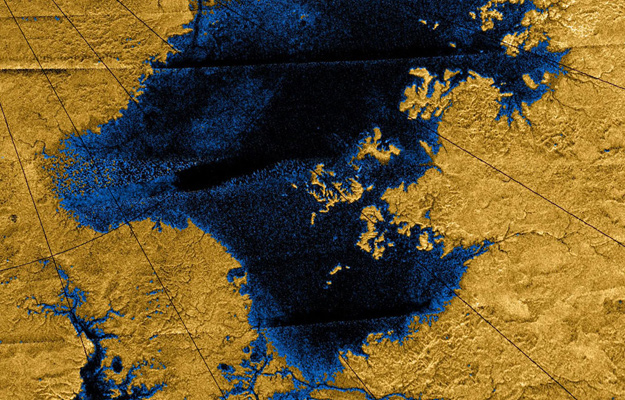Navigating the Seas of Titan

Humanity has landed a rover on Mars. Now, say scientists, it’s time to land a boat on Titan. This outlandish scenario could become reality, according to engineers presenting their proposals at the European Planetary Science Congress on 27 September.
Titan, Saturn’s largest moon, is one of the most Earth-like bodies in the solar system. With a thick atmosphere, a diameter between that of Earth and the planet Mercury, and a network of seas, lakes and rivers, it is in many respects more like a planet than a moon like the Earth’s.
The Cassini-Huygens mission, which studied Titan extensively in the 2000s, confirmed that lakes, seas and rivers of liquid hydrocarbons (similar to household gas) exist, covering much of the satellite’s northern hemisphere. Although it eventually landed on solid ground, the Huygens lander was designed to be able to float for a short period.
The new plans, called the Titan Lake In-situ Sampling Propelled Explorer, proposes a boat-probe, propelled by wheels, paddles or screws. The probe would land in the middle of Ligeia Mare (the biggest lake, near Titan’s north pole), then set sail for the coast, taking scientific measurements along the way. The mission would last around six months to a year.
“The main innovation in TALISE is the propulsion system,” says Igone Urdampilleta (SENER), a member of the TALISE team. “This allows the probe to move, under control, from the landing site in the lake, to the closest shore. The displacement capability would achieve the obtaining of liquid and solid samples from several scientific interesting locations on Titan’s surface such as the landing place, along the route towards the shore and finally at the shoreline.”
Titan’s environment is too cold for life as we know it, but its environment, rich in the building blocks of life, is of great interest to astrobiologists. The satellite’s atmosphere is made up largely of nitrogen (like Earth’s), is rich in organic compounds and hydrogen cyanide, which may have played a role in the emergence of life on Earth.
The TALISE concept is being developed as a partnership between SENER and the Centro de Astrobiologia in Madrid, Spain. This mission concept is the result of a ‘Phase 0’ study. In the following phases the feasibility study and a preliminary mission architecture would be realized to consolidate a possible technical proposal for future space science mission call.
Press Contacts:
Anita Heward
EPSC 2012 Press Officer
+44 7756 034243
anita.heward@europlanet-eu.org
Oliver Usher
EPSC 2012 Press Officer
+44 7754 130109
o.j.usher@gmail.com
EPSC Press office (24-28 September only)
+34 91 722 3020, +34 91 722 3021
Fax: +34 91 722 3022
Science Contact:
Igone Urdampilleta
igone.urdampilleta@sener.es
+34 918078782, cell: +34 663549738
(Dr. Urdampilleta will be at the conference only on 27 Sept.)
Images
http://www.europlanet-eu.org/outreach/images/stories/epsc2012/talise_3.jpg Wheeled concept for TALISE probe This rendering of the proposed TALISE probe shows one possible means of propulsion: wheels on either side of the probe. Credit: SENER
http://www.europlanet-eu.org/outreach/images/stories/epsc2012/talise_2.jpg Screw concept for TALISE probe This rendering of the proposed TALISE probe shows one possible means of propulsion: screws on either side of the probe. Credit: SENER
http://www.europlanet-eu.org/outreach/images/stories/epsc2012/talise_1.jpg Paddle concept for TALISE probe This rendering of the proposed TALISE probe shows one possible means of propulsion: paddle wheels on either side of the probe. Credit: SENER
SENER
SENER is a private engineering and technology group founded in 1956, which seeks to offer its clients the most advanced technological solutions and which enjoys international recognition, thanks to its independence and its commitment to innovation and quality. SENER has a workforce of more than 5,200 professionals and a turnover of O1.16 billion (2011 figures). SENER engages in the specific activities of Engineering and Construction, and also has industrial holdings in companies involved in Energy and Environment, as well as in Aeronautics.
European Planetary Science Congress 2012
The European Planetary Science Congress (EPSC) is the major European meeting on planetary science and attracts scientists from Europe and around the World. The 2012 program includes more than 50 sessions and workshops. The EPSC has a distinctively interactive style, with a mix of talks, workshops and posters, intended to provide a stimulating environment for discussion. This year’s meeting will take place at the IFEMA-Feria de Madrid, Spain, from Sunday 23 September to Friday 28 September 2012. EPSC 2012 is organized by Europlanet, a Research Infrastructure funded under the European Commission’s Framework 7 Program, in association with the European Geosciences Union, with the support of the Centro de Astrobiologia of Spain’s Instituto Nacional de Tecnica Aeroespacial (CAB-INTA). Details of the Congress and a full schedule of EPSC 2012 scientific sessions and events can be found at the official website: http://www.epsc2012.eu/
Europlanet
The Europlanet Research Infrastructure is a major (O6 million) program co-funded by the European Union under the Seventh Framework Program of the European Commission. The Europlanet Research Infrastructure brings together the European planetary science community through a range of Networking Activities, aimed at fostering a culture of cooperation in the field of planetary sciences, Transnational Access Activities, providing European researchers with access to a range of laboratory and field site facilities tailored to the needs of planetary research, as well as on-line access to the available planetary science data, information and software tools, through the Integrated and Distributed Information Service. These programs are underpinned by Joint Research Activities, which are developing and improving the facilities, models, software tools and services offered by Europlanet RI.
Europlanet Project website: http://www.europlanet-ri.eu/
Europlanet Outreach website: http://www.europlanet-eu.org/outreach
Follow #epsc2012 @europlanetmedia on Twitter








